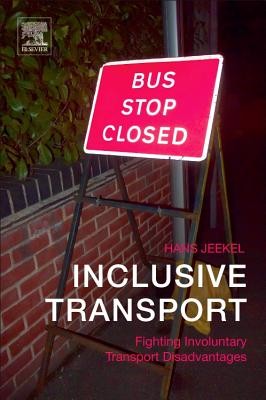
- We will send in 10–14 business days.
- Author: Hans Jeekel
- Publisher: Elsevier
- ISBN-10: 0128134526
- ISBN-13: 9780128134528
- Format: 21.6 x 27.9 x 1.3 cm, softcover
- Language: English
- SAVE -10% with code: EXTRA
Reviews
Description
Inclusive Transport: Fighting Involuntary Transport Disadvantages offers readers profound and multifaceted insights into transportation and social equity, guiding transportation and urban studies researchers, planners, and policy makers in evaluating potential solutions to this complex issue. It considers discrimination and its societal consequences, providing a needed perspective on who is left out of transportation planning, and why.
The book is systematically divided into 2 parts, Part A is problem oriented and explores the main problems to the transportation disadvantaged; accessibility and affordability. It looks at the consequences of non-accessibility, the problems non-car owners face, and the interplay between housing and transportation; Part B is policy oriented and analyses how current policies tend to forget transport disadvantages. It looks at pragmatic solutions for transport disadvantaged and ends with a design for inclusive transport, being a more radical approach combining sustainability challenges, people's behaviours and emotions, creating more just and equitable mobility.
EXTRA 10 % discount with code: EXTRA
The promotion ends in 19d.14:59:25
The discount code is valid when purchasing from 10 €. Discounts do not stack.
- Author: Hans Jeekel
- Publisher: Elsevier
- ISBN-10: 0128134526
- ISBN-13: 9780128134528
- Format: 21.6 x 27.9 x 1.3 cm, softcover
- Language: English English
Inclusive Transport: Fighting Involuntary Transport Disadvantages offers readers profound and multifaceted insights into transportation and social equity, guiding transportation and urban studies researchers, planners, and policy makers in evaluating potential solutions to this complex issue. It considers discrimination and its societal consequences, providing a needed perspective on who is left out of transportation planning, and why.
The book is systematically divided into 2 parts, Part A is problem oriented and explores the main problems to the transportation disadvantaged; accessibility and affordability. It looks at the consequences of non-accessibility, the problems non-car owners face, and the interplay between housing and transportation; Part B is policy oriented and analyses how current policies tend to forget transport disadvantages. It looks at pragmatic solutions for transport disadvantaged and ends with a design for inclusive transport, being a more radical approach combining sustainability challenges, people's behaviours and emotions, creating more just and equitable mobility.


Reviews